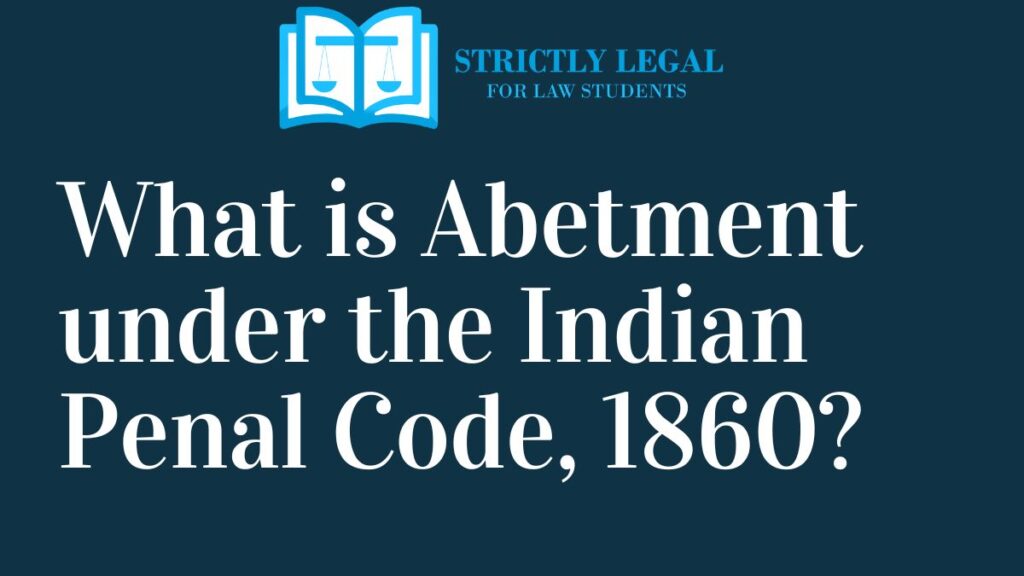Sometimes, even if you are not committing any offense directly, but indirectly if you are involved in committing an offense, that itself may also become an offense. In a crime of the said nature, the offenders do not involve themselves directly. These offenses are mentioned u/s 107 of the Indian Penal Code, 1860 [herein after referred to as IPC] under the chapter of Abetment. Chapter V of IPC mentions about the concept of abetment. In a layman’s term, abetment refers to the action of instigation, encouragement, or promotion of a person to commit an offense. It can also refer to helping the offender to commit an offense. In the case of Sanju v. State of Madhya Pradesh, the Honorable Apex Court defined the term ‘abet’ as to aid, to assist or to give aid, to command, to procure or to counsel, to countenance, to encourage, or set anyone to commit. The explanation of ‘abet’ as laid down by the Apex Court makes it crystal clear that abetment only occurs when there are at least two persons involved. In a nutshell, the term ‘abet’ derives help, co-activity, and support and assimilates within its purview, unlawful reason to commit a crime.
Table of Contents
Abetment under the Indian Penal Code
Abetment is comprised by the following three reasons:
– Instigating a person to commit an offense or;
-Engaging in an conspiracy to commit or;
-Intentionally helping a person to commit it.
The offence of abetment via instigation counts on the intention of the person who abets and NOT upon the act which is committed by the individual who has abetted. The abetment might be instigation, connivance or intentional aid with a purpose as mentioned u/s 107 of the IPC. Nonetheless, the words segmented in an angry state or omission without any intention or motive, cannot be termed as instigation.
For a person to be called liable for abetment, and to proceed against an individual for a criminal offense u/s 107 IPC, the counsel for the prosecution must allege the component of mens rea. Negligence or carelessness cannot be named to fall under abetment with regards to punishing the person liable, as per the arrangement of the penal laws.
In order to establish that an ‘abetment’ has taken place, the abettor must have performed the act on purpose by supporting the commission of the wrongdoing. In such a case, it is just to be proven that the wrongdoing charged could not have occurred had not it been the support of the abettor is not ample within the ambit of Section 107 IPC.
In the case of Rajat Prasad v. CBI, observed that a wrongdoing does not stand crushed or exonerated just in light of the fact that its benefit extends to the general public at large. For example, if an individual refrains from preventing an offense to take place, so the enquire begins as to if this failure will make to Abetment or not. Such a situation of law, has later been articulated by the Honorable Apex Court which anyway contended that even though he is not an abettor, the Court would even now need proof on material specifics, as he is the primary observer of the wrongdoing and as it is dangerous to hang the accused on his sole declaration, except if the Court feels persuaded that he is talking reality.
Punishment for Abetment under the Indian Penal Code
For the public on loose, the offense of Abetment is treated as a separate offense and being punishable might sound peculiar because it has been so guzzled in almost everyone that only the ‘perpetrators’ of the crime are punished. The Indian Penal Code, has however explained in detail how the abetment laws are classified. They are as follows:
Section 109 of the Indian Penal Code, 1860 states that the one who abets an offense is given the same punishment as that of the principal perpetrator of the crime if the actus reus of the principal offender has occurred as a result of the inducement made by the abettor.
Section 110 of the Indian Penal Code, 1860 clarifies that if the person abetted commits the offense with an intent that is different than the intention of the chief perpetrator of the offense, yet the abettor will be charged with the punishment provided for the offence abetted. The liability of the individual abetted isn’t influenced by this section.
Section 111 of the Indian Penal Code, 1860 carries on with the development of abetment laws around the phrase that “each man is deemed to intend the corollary outcomes of his act.” In short, if one man operates to carry on with a particular wrongdoing, on the lookout for instigation, carries on just that wrongdoing but carries out another wrongdoing in the advancement of it, the prior is criminally accountable as an abettor with respect to the last mentioned wrongdoing, in the event that it is one which, as a person with the intelligence of a prudent man, at the time of incitement would have known to be committed so as to execute the original crime.
Section 112 of the Indian Penal Code, 1860 mentions the guidelines formulated in the previous section. It says that an abettor is accountable for the offenses abetted and also for the offenses committed.
Elements of Abetment
As mentioned above, the concept of Abetment highly matters on the mens rea of the abettor than the act which is done by him. It is irrelevant if the person instigated commits the offense or not or if the persons plotting together, literally execute the conspiracy. It is in the case of a person abetting an offense with an intention of aiding the other to commit that particular offense that the charge of abetment against him would be expected to break down when the person claimed to have committed the offense is absolved of that offense. The Honorable Court of Law, in the case of Faguna Kanta Nath v. State of Assam, observed that the appellant, in this case, was tried for an offence u/s 165 A for abetting the commission of an offense by an officer, who was absolved or acquitted, and it was contended that the appellant’s conviction for abetment was also not maintainable. However, in due course, the case of Jamuna Singh v. State of Bihar ruled that it was considered to be not desirable to observe that an abettor cannot be punished if the person who has literally committed the offense is acquitted. The Honorable Court contended that the guilt of the abettor depends on the nature of the offense abetted and the way of abetment.
Distinction between Abetment and Common Intention
| Abetment | Common Intention |
| Abetment free stands as an offense and can be punished all by itself. | Having a common intention is not an offense on its own and it is a MUST to have it read with in agreement with other crimes. |
| The Accused may not be present at the crime scene. | The presence of the accused is a crucial element and participation, may it be actively or passively. |
| The Crime need not be committed. | The Crime must be committed. |
Conclusion
After reading this article till now, it must have been clear that the accused is not the only one to take the guilt. Contrary to the popular misconception, not only the perpetrator or accused of the crime/ offense but also his or her collaborator will be liable or accountable for the case.

Law student.
Turning legal insights into engaging narratives.





